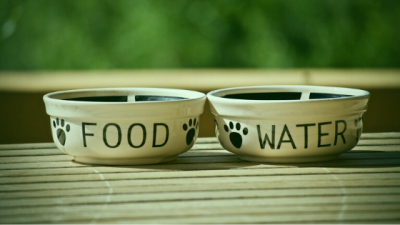When to Give Medication with Food
Ask PHP Pete!
Dear PHP Pete,
I recently picked up my pup’s medication and your pharmacist recommended that I give his medication with food. Why are some medications given with food while others are given on an empty stomach?
Thanks,
To Eat or Not to Eat

Dear To Eat or Not to Eat,
The conditions within the digestive tract change as it goes from empty to full. Most medications are absorbed in the small intestine after leaving the stomach. When the stomach is full, it is more acidic and medications spend more time there; this is beneficial for the absorption of some medications but reduces the absorption of others.
Medications with Food
When food is present, the stomach becomes more acidic and the absorption of some medications is improved.
- Fluconazole and the capsule-form of itraconazole are antifungal medications that benefit from the presence of acid.
- Griseofulvin and theophylline are absorbed best with a fatty meal.
- NSAIDs (non-steroidal anti-inflammatory drugs) should be given with food to minimize stomach upset.
- Ursodiol reduces the absorption of cholesterol and is often given with or just after meals.
Medications without Food
Some medications benefit from the low acidity of an empty stomach and may be absorbed faster because there is no food present. Giving some medications before a meal allows time for them to take effect.
- Omeprazole, and other acid-reducing drugs, are often given before a meal to help minimize stomach acid levels.
- Some medications (cisapride, for example) help food move through the gut. Other medications reduce nausea and encourage eating.
Food can sometimes decrease the body’s absorption of a medication. Because of this, certain medications should be given on an empty stomach to avoid interacting with other chemicals or substances that may inhibit their effectiveness:
- The antibiotic azithromycin tends to break down with extended exposure to acid.
- Digoxin is a heart medication that experiences reduced absorption when it binds with fiber.
- Some medications, such as doxycycline, may bind to calcium from dairy products, creating compounds that the body has difficulty absorbing.
If you are unsure if your pet’s medications should be given with or without food, please check with your pet’s pharmacist or veterinarian. Many medications do not have food restrictions, but you may want to give these medications with food if stomach upset occurs. The examples above are a general guide; your veterinarian may want you to give medications differently based on your pet’s individual needs.
Sincerely,
PHP Pete
- McLachlan, Ramzan I. Meals and medicines. Australian Prescriber 2006; 29:40-2.
- Bushra R, Aslam N, Khan AY. Food-drug interactions. Oman Medical Journal 2011; 26: 77-83.
- Avoid Food-Drug Interactions: A guide from the National Consumers League and US Food and Drug Administration. https://www.fda.gov/Drugs.





